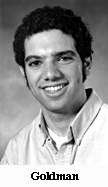Cornell senior Joshua Goldman receives prestigious Marshall Scholarship to study at Cambridge and Edinburgh
By Bill Steele

Joshua Goldman, a senior majoring in physics at Cornell University, is one of 40 student winners nationwide of the prestigious Marshall Scholarship for two years of study in the United Kingdom.
Goldman, a Cornell Presidential Research Scholar, will spend the first year at Cambridge University studying applied mathematics and theoretical physics, including such topics as cosmology and string theory. He plans to complete Part III of the Mathematical Tripos, the last year of a four-year honors program for Cambridge students. The following year, he plans to study at the University of Edinburgh, Scotland, for a master's degree in condensed matter physics, the area of study in which he has concentrated at Cornell. Thereafter, he said, he plans to return to the United States to complete a doctorate in physics.
Cornell President Hunter Rawlings said: "We are very proud of Josh Goldman's earning a Marshall Scholarship. He is an exemplary Cornell student and a perfect example of a Presidential Research Scholar: He has a commitment to original research as well as to the broader cultural life of the campus."
"I'm very excited, and the response from the Cornell community has been overwhelming; I've heard from 30 people today," Goldman said after the scholarship was announced.
Goldman also received a 2001 Barry M. Goldwater Scholarship for science and mathematics in April of this year.
His research at Cornell, supervised by Robert Thorne, professor of physics, has involved the investigation of electronic and structural properties of quasi-one-dimensional conductors. He studies charge-density waves, a phenomenon bearing similarities to superconductivity. He also has worked with simulations and hardware on the CLEO particle detector at Cornell's Wilson Synchrotron Laboratory.
Goldman performs in the Cornell Percussion Ensemble and plays the piano, and has been active in civic affairs on campus, serving as president of the Society of Physics Students in 2000-01 and as vice president of Kappa Delta Rho fraternity. He is co-chair of Arts and Sciences Ambassadors, a student organization that assists in recruiting high school students to attend Cornell. This is his fifth semester as a tutor in the physics program at Cornell's Learning Strategies Center.
He is a member of the Quill and Dagger senior honor society and the Student Advisory Board of the Cornell Presidential Research Scholars program, and he served on the Stephen H. Weiss Presidential Fellows selection committee.
During summers and breaks, he has operated ground-penetrating radar for archaeological explorations, including surveys in Mexico, Italy and Honduras, with Larry Brown, Cornell professor of earth and atmospheric sciences. More recently, he spent the summer of 2001 doing research on superconductivity at the University of California, San Diego as part of the Research Experience for Undergraduates program funded by the National Science Foundation.
Goldman attended South Tahoe High School, where he was valedictorian, a National Merit finalist, an AP National Scholar and a member of the 1998 U.S. High School Physics Team. His parents, Steve and Harriet Goldman, live in South Lake Tahoe, where his father is an environmental planner for the California Tahoe Conservancy and his mother consults on group facilitation.
The Marshall Scholarship program was founded by an Act of Parliament in 1953 to commemorate the humane ideals of the European Recovery Programme (Marshall Plan) and to allow potential leaders, opinion-formers and decision-makers in the United States to gain an understanding and appreciation of British values and the British way of life. It is funded by the British government and is administered, in the United Kingdom, by the Marshall Aid Commemoration Commission and, in the United States, by the British Embassy in Washington, D.C., and by eight regional consulates-general.
This year, 12 Cornellians submitted Marshall Scholarship applications and 10 were endorsed by a faculty committee to represent Cornell to the Marshall Commission. In a typical year, the commission receives from 800 to 1,000 applications from which the 40 winners are chosen. Cornell had two winners of the Marshall Scholarship in 1999 and one in 2000. Including Goldman, 28 Cornellians have been offered the scholarship since 1962.
Media Contact
Get Cornell news delivered right to your inbox.
Subscribe